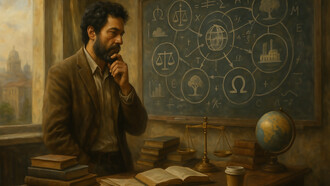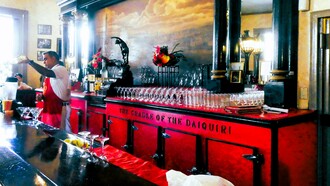Oscar Wilde once famously said, “I have nothing to declare but my genius.” Only Wilde could get away with saying this. For most, this affirmation would seem pompous. But for Wilde, it turned out to be true.
In many ways, Wilde was a genius. He wrote plays, poems, short stories, books, and essays. He had a sharp wit, supreme intelligence, and an instantly recognizable style. Through his satire and humour, he explored the nature of the human condition, in an everlasting quest for beauty and perfection. He was one of the first English-speaking authors to draw attention to the works of Dostoyevsky and Flaubert. Today, he is remembered as one of the most important writers and dramatists of the Victorian era and is the second most-read and translated author in the English language after Shakespeare.
However, Wilde is so much more than his literary legacy. His genius lies beyond, in his flamboyant personality and captivating life. He was a liberated man in a society that condemned individualism. He was simply himself.
A fascinating figure
Oscar Fingal O’Fflahertie Wills Wilde was born on October 16th, 1854, in Dublin. With a name like that, he could only be destined for great things. His father, Sir William Wilde, was an ophthalmic surgeon (eye surgeon), the ophthalmic royal surgeon nonetheless, and his mother was a poet.
Like many Irish protestants, Oscar Wilde attended Trinity College in 1871. One of his tutors, John Pentland Mahaffy, considered one of the greatest classics scholars of his day, wrote a letter to the Master of Magdalene College praising Wilde’s intellectual abilities. Soon after, Wilde won a grant to study at Oxford, where he won several prizes. In a viva voce examination, examinators asked him to translate a Greek passage of the New Testament. Wilde read it and fluently translated it into English. Satisfied, the examinators asked him to stop, but Wilde carried on, and said “Oh, do let me go on. I want to see how it ends.”
Wilde was an extraordinary figure not only for his promising prospects, but also for his quick wit, his use of language, and how he dressed. Nobody had ever seen anything like it before, to the point that he became famous when he was only an undergraduate, not because of anything he wrote, but because of how he presented himself. In his second year at Oxford, a newspaper interview him, asking him about his ambitions, and he retorqued “to live up to my blue China.” After this wonderful comeback, the British press and the entire continent became fascinated with him, solely based on his personality. He left Oxford with many prospects, planning on being a politician. At this point, he still had not written anything of significance yet.
Defying social conventions
Wilde brought new energy into an old world. His whole presence was magical and captivating, in a repressed Victorian society, marked by sobriety, decency, and a sense of moral purpose. Ironically, Victorian society was aware of its repression, best described through Stevenson’s The Strange Case of Dr. Jekyll and Mr. Hyde. This same society became scandalised yet fascinated with Wilde because he embraced who he truly was, at a time when people had to follow social norms and repress their instincts.
Wilde was, to say the least, unconventional. He was colourful and full of life. While others wore black clothes, he wore silk, velvet breeches, and fur coats. The dandy did what others couldn’t do, and became famous for being unconventional. His ideas on art, beauty, and even personal freedom challenged Victorian preconceptions. He defied societal conventions by becoming himself, as Nietzsche would say. “To love oneself is the beginning of a life-long romance” declared Wilde, in Victorian society, centred around collectivism rather than individualism.
Very few people become famous solely for their personality or the way they dress, except for Wilde. Gilbert and Sullivan satirically portrayed him in their operetta Patience (1881), because he was so well-known in Victorian society. Richard D’Oyly Cart, a powerful theatrical producer and booker, wanted to export this show to Broadway and sent Wilde to America for a year so foreign audiences could get familiar with his character. It was at the American border that Wilde made the famous remark about his genius when he still hadn’t written anything of modern value yet. In America, he lectured on two subjects, the “House Beautiful”, the first recorded example of someone lecturing on interior decoration; and on the life and works of the Italian Renaissance sculptor and goldsmith Benvenuto Cellini. Wilde’s fabulous personality shocked and charmed audiences, establishing his celebrity overseas.
Wilde was also a great storyteller, captivating his audiences. Sir Arthur Conan Doyle, who met Wilde at a dinner party, described him as the most brilliant speaker he ever heard. W.B. Yeats also admired his eloquence, while he didn’t admire the man. Many great personalities lauded the Irish writer, such as George Bernard Shaw, John Ruskin, Henry Wadsworth Longfellow, and even Walt Whitman. Allegedly, Oscar Wilde once said to André Gide: “I’ve put my genius into my life; I’ve put only my talent into my works.”
His genius for living, as Wilde so brilliantly put it himself, made him an icon of the Aesthetic movement at the time, an artistic movement championing beauty over utility, “art for art’s sake” as Théophile Gautier put it. During his lifetime, Wilde perpetuated this imagery of the man and the myth, projecting a flamboyant character, knowing that his legacy would live on, another sign of his everlasting genius. He became known as the man who, according to Gide, smoked “gold-tipped cigarettes and who walked about in the streets with a sunflower in his hand,” pronouncing witty aphorisms, and wearing dandy clothing, becoming the perfect representation of the Aestheticism movement, frequently associated with the sunflower and the lily.
Wilde’s return to England was triumphant. He finally published his first collection of poems in 1881, and married Constance Mary Lloyd in 1884, with whom he had two children, Cyril and Vyvyan. He edited a woman’s magazine, wrote poems, and developed as an artist. He wrote The Picture of Dorian Gray in 1891, and short stories in 1888, such as The Happy Prince and Other Tales, which he wrote for his sons. Wilde’s genius relied on his combination of realism and fantasy through vivid imagery and realistic dialect, with a surprising awareness of the darkness of human nature.
However, he truly became a celebrity in his lifetime for his highly popular comedic plays, establishing him as the greatest playwright of his time. He used wit as an art, something that hadn’t been done at the time. These include Lady Windermere’s Fan (1892), An Ideal Husband (1895), and The Importance of Being Earnest (1895). This last play proved to be his downfall.
A messianic downfall
Oscar Wilde defied the conventions of his lifetime, through his original writing, brilliant words, and extravagant dress sense, but mostly through his remarkable ability to be himself, which would provoke his downfall. Wilde claimed he “treated art as the supreme reality and life as a mere mode of fiction.” Therefore, he had freedom of thought and lead his life as it pleased him, regardless of the consequences. He was a free man, with a huge soul and a genius-like ability to be himself.
In his Being and Nothingness (1943), Sartre wrote that men are “condemned to be free,” in the sense that every person is responsible for every choice they make, and remains free, even when imprisoned, as no one can remove one’s freedom of thought. Oscar Wilde never veered from this freedom, but this came with consequences.
In 1891, Oscar Wilde met Lord Alfred Douglas, known as “Bosie,” who descended from the Black Douglasses, an infamous Scottish family. Wilde fell head over heels in love with the handsome, charming, and arrogant young man. They became lovers, travelled together, hosted dinner parties, and stayed at hotels, at a time when the word ‘homosexual’ didn’t even exist.
This affair also coincided with Wilde’s success as an artist, where he started to make a name for himself. Exploring his sexuality led him to explore and refine his authentic style, coinciding with his artistic success. However, rumours of the illicit love affair spread and Bosie’s father, the Marquess of Queensbury, demanded Wilde stop seeing his son, and threatened violence against restaurant and hotel managers that allowed the couple on their premises. Oscar refused, and the Marquess tried to attend the premiere of The Importance of Being Earnest to throw rotten vegetables at the stage. The doorman barred him entry, and Bosie’s father addressed a letter to Wilde, writing on an unsealed envelope at the Albermale Club, where he often went, “to Oscar Wilde, posing as a sodomite.”
The Irish playwright sued the Marquess for libel, hoping to clear his name. However, the trial took a turn, and Wilde was arrested. The judge claimed this was the worst case he tried, after he just trialled a case of child murder, and sentenced Wilde to two years of prison, doing hard labour. The writer didn’t escape his sentence and ended up imprisoned, bankrupt, with his reputation tarnished. He went from an acclaimed playwright to a despised prisoner in a short period of time.
During his last year in prison, he wrote an essay, “De Profundis”, addressed to Bosie, detailing their destructive love affair, and how Bosie drained him artistically, emotionally, and financially. Wilde became aware he could have consecrated more time to this art, and this heartfelt letter questions the role of an artist. Finally released in May 1897, Wilde exiled himself in Paris, under the name of Sebastian Melmoth, based on Charles Maturin Gothic novel “Melmoth the Wanderer.” There, he lived in relative poverty, before he died in November 1900. He published his final poem two years before, “The Ballad of the Reading Gaol, ” under the name “C.3.3”, his cell block and cell number during his prison sentence.
While British society now recognizes its error and pardoned Oscar Wilde for a crime that wouldn’t be one today, Wilde’s fall was quasi-messianic. He was honest in a world that didn’t want to know the truth, at least not openly.
Everything Wilde did, he did wholeheartedly. He exposed his soul to the public, both through his writing exploring the corners of the human soul, and through his shocking trial, literary exposing his bed linen. Honesty as an artist is the hardest and best thing one can achieve. Wilde was honest and free with his ideas, his thoughts, his style, and his sexuality. He even went to prison because of his ideas on beauty and pleasure, and his libertine lifestyle.
Wilde’s genius lies in the exploration of the human soul, through his art, but also through himself, exploring his sexuality, and debunking societal concepts. The artist promoted hedonism as a way out of a repressed society, aligning his values with the modernist concepts of individualism that emerged in Europe at the time. In many regards, Wilde became one of the first modern men of Western society.














